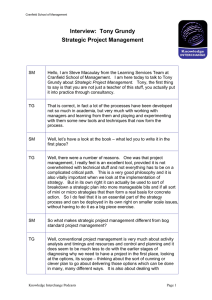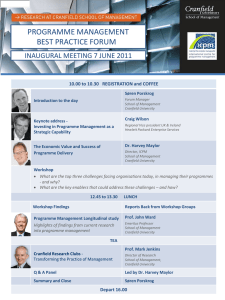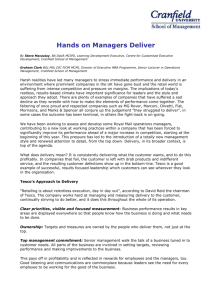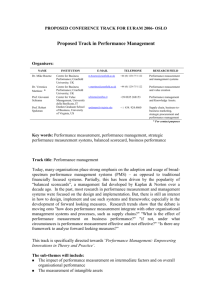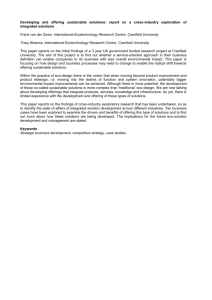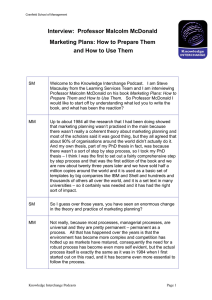Interview: Tony Grundy Be Your Own Strategy Consultant
advertisement
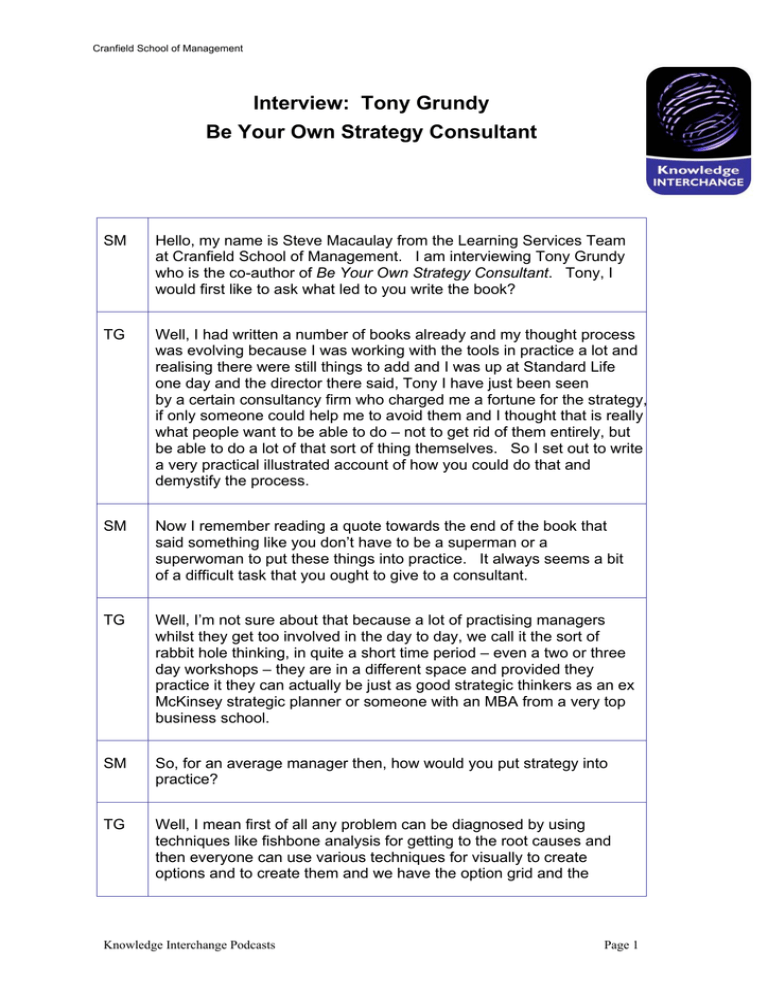
Cranfield School of Management Interview: Tony Grundy Be Your Own Strategy Consultant SM Hello, my name is Steve Macaulay from the Learning Services Team at Cranfield School of Management. I am interviewing Tony Grundy who is the co-author of Be Your Own Strategy Consultant. Tony, I would first like to ask what led to you write the book? TG Well, I had written a number of books already and my thought process was evolving because I was working with the tools in practice a lot and realising there were still things to add and I was up at Standard Life one day and the director there said, Tony I have just been seen by a certain consultancy firm who charged me a fortune for the strategy, if only someone could help me to avoid them and I thought that is really what people want to be able to do – not to get rid of them entirely, but be able to do a lot of that sort of thing themselves. So I set out to write a very practical illustrated account of how you could do that and demystify the process. SM Now I remember reading a quote towards the end of the book that said something like you don’t have to be a superman or a superwoman to put these things into practice. It always seems a bit of a difficult task that you ought to give to a consultant. TG Well, I’m not sure about that because a lot of practising managers whilst they get too involved in the day to day, we call it the sort of rabbit hole thinking, in quite a short time period – even a two or three day workshops – they are in a different space and provided they practice it they can actually be just as good strategic thinkers as an ex McKinsey strategic planner or someone with an MBA from a very top business school. SM So, for an average manager then, how would you put strategy into practice? TG Well, I mean first of all any problem can be diagnosed by using techniques like fishbone analysis for getting to the root causes and then everyone can use various techniques for visually to create options and to create them and we have the option grid and the Knowledge Interchange Podcasts Page 1 Cranfield School of Management Tony Grundy octopus and tractions and difficulty analysis for that. All the visual tools which people can carry in their heads and around them, or use them on paper and show to each other. So we are not talking about necessarily selling a major business or massive restructuring going into an entire new market – it could be simply how they actually set about their job strategically. SM One of the quotes that you said in the book was that people can fall down some way between operations and strategy – what actually did you mean there? TG Well for a start people think they are being strategic when they are actually quite operational – they have not really started to think about choices, the environment. And also there is a tendency to call everything strategy or strategic in organisations. In one major telecoms company about four hundred people had it in their title – I said, well the word strategic, well have you actually defined it? And they said no, I said that’s why we have problems. And also most managers, pretty senior managers, either don’t go on these courses to learn because their embarrassment, don’t have the time to do an MBA, self taught, think that just SWOT analysis is going to get them there or mainly just make mistakes and learn vaguely how to avoid them in the future. So they don’t actually have the full map to get there, so there are a whole number of reasons why people struggle to migrate from operational to strategic – and the other thing to say is that strategy isn’t just abstract, it's about operations anyway, you can’t talk here purely theoretically about it. It needs to look at real tangible things like real competitive advantage and real performance and real positioning. SM Give me some examples of business problems that the approach you are suggesting should be addressing. TG Well, there are things like some sort of team restructuring that someone could be going through, or they have got a new boss that they need to try and influence in a more strategic way. A project which has an unclear direction, not really any kind of special resources that enable it to get there with what we call the cunning plan tool. So its generally that sort of level that you get started and even if you are doing a full scale strategic plan at say, for example Tesco, you wouldn’t take doing the entire plan for Tesco, you might take cheese or maybe DVDs and that would be the unit of analysis and then build up to the bigger picture, rather than necessarily always the other way round. Knowledge Interchange Podcasts Page 2 Cranfield School of Management Tony Grundy SM So what is this cunning plan then? Tell me a bit more about that. TG Oh, well cunning plan that I take from Blackadder. It's about achieving what you want to do in a novel way which has got some simple elements, but some things that are quite surprising and which if it is in a competitive context is quite hard for other people to imitate or to take your position from you. SM What I would like to do is you have obviously got a lot of experience of working with managers – give me some examples where the approaches that you have suggested have been put into practice and have really worked. TG Well, the most amazing example was perhaps eleven years ago when I was used myself to facilitate and I was able to work with Tesco to look at their non food business, which was minor scale at the time apart from petrol – maybe is was about half a billion. Now it is actually eleven billion, eleven years on and the tools we used were SWOT analysis, we looked at growth drivers, we did the option grids, stakeholders – not a vast number of tools, but the most important thing was to actually work that through as a systematic process with some competitor research, with some kind of alien thinking about where we could go if the aliens landed with Tesco, and also future thinking – we time travelled some five years into the future, saw where Tescos was going to be in the future – saw it being dominant and then worked backwards to how we got there and it gave the team the confidence for the first time to actually go for it and that was quite simple on the basis on their success. SM Great. One of the things inevitably that is going to happen is some of your ideas don’t work out the way managers or you thought they were going to – are there any examples of that, and particularly why they didn’t work so well? TG Well I had one recently because I knew it was always going to be a difficult one – there was a charity and basically we did some excellent work generating options, the octopus generating no less than 80 lines of enquiry for them, which were then about priorities. Unfortunately there was so much politics around and lack of clarity about what the chief exec had actually positioned as being the strategy previously that the whole thing ground to a halt. So it just emphasises the fact that it is not just an analytical thing, its not just creating the cunning plan, but it's very, very much a behavioural and political thing. Having said that there is a tool buried in the book called the peace, about we are not Knowledge Interchange Podcasts Page 3 Cranfield School of Management Tony Grundy going to be political, pedantic, etc. Had I used that earlier on, then we would have been perhaps in a slightly different space, so it just shows that the stuff I put in book, you may just think that’s only on 343 and just a throwaway comment, but it is all of value. SM If I were to pick out some key messages from your book, what would you like to leave people with? TG Well, I think that you don’t want to have the average plan, you want to be inventive, to be truly inventive it's like being an artist, you have got to do some work, go back to it, critique it, make it better we call that, at Diageo (Guinness Group), the building challenge process. So you are building things, you challenge it , you are in and out of that. So it’s a very iterative process, very creative and that means you have to take a variety of different perspectives – it's not just about the tools. So that is, I think, the most important message. And also perhaps the fact that it does – as in the Tesco case – give you an awful lot of value, not only at the business level, but also in terms of your career. SM Is there anything that you would like to add that you think we have not covered, that we should? TG Just quickly then, I think you were asking earlier about if I were to write it again today, are there any things that I would emphasise even more – I think number one is the importance of being cunning or, not devious, but being inventive in terms of the influencing process. I think that that is a key blockage or enabler to help people to do this and there is a lot more stuff on that. There is also emphasising more the cunning plan, I know that actually that comes into its own particularly when dealing with stakeholders so there is probably more I would emphasise there and I think the last two things are scenarios – I have always been a believer in them, but I think they should be more central and not just an add on to the strategy process, story telling the future and the final thing is that actually working recently in the mobile phone industry myself, it just emphasises that the imitability – if you do something, what are the others going to do. Trying to make sure there are sufficient barriers to other people just copying you – it's just so important, especially in very dynamic industries and I think that goes back to resource based theory of competitive advantage, which is a big theory obviously. But some of the simple stuff around that is still not getting into management practice, which is try to identify your unique resource if you can, if you have got any at all. But if you have got something like that or a unique plan you have got to try to make it more stealthy or protect it some way – making it generally a lot more resilient because you can’t always rely on competitors being weak. Knowledge Interchange Podcasts Page 4 Cranfield School of Management Tony Grundy SM Tony Grundy, thank you very much. TG Thank you. Transcript prepared by Learning Services for the Knowledge Interchange www.cranfield.ac.uk/som Knowledge Interchange Podcasts Page 5 Cranfield School of Management Produced by the Learning Services Team Cranfield School of Management © Cranfield University 2007
